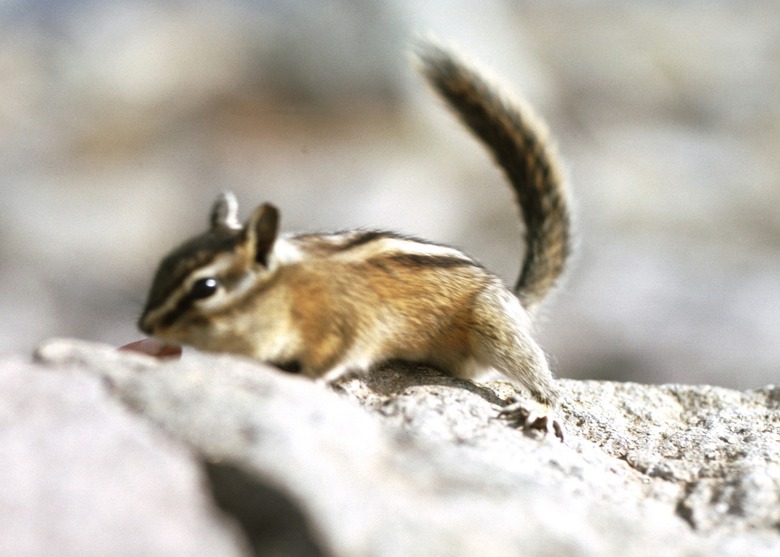Do Chipmunks Burrow In The Ground?
Whether you live in New Hampshire, Oregon or somewhere in between, you have probably seen a chipmunk running through your yard or through a local park. These small creatures usually live in forests, at the edge of woodlands, or in yards and gardens. They are quiet and small, often going about their business without bothering anyone or even being noticed – unless they decide to make a burrow in your vegetable garden or under your patio. These striped members of the rodent family live and store food in long burrows they dig underground.
TL;DR (Too Long; Didn't Read)
Chipmunks do burrow into the ground. They live and store food in underground burrows.
Types of Chipmunks
Types of Chipmunks
There are 25 known species of chipmunks, and all but one are native to North America. All chipmunks belong to the genus Tamias, which is a group of small squirrels with stripes that live on land. Chipmunks have furry tails, claws and internal cheek pouches, which they use for moving food.
The bodies of chipmunks range in size from about three to six inches long, and their tails are usually two to five inches long. The largest chipmunk is the eastern chipmunk (Tamias striatus), which weighs up to five ounces. The least chipmunk (T. minimus) is the smallest chipmunk, at about half the weight of the eastern chipmunk.
Other types of chipmunks include the Hopi chipmunk (T. rufus), which lives in the American Southwest, and the Siberian chipmunk (T. sibiricus), which lives in Russia, Siberia, Japan and China. The range of Townsend's chipmunk (T. townsendii) extends from British Columbia through western Washington and Oregon.
Behavior of Chipmunks
Behavior of Chipmunks
Chipmunks are omnivores, meaning they eat both plant and animal materials. According to the University of New Hampshire Cooperative Extension, eastern chipmunks eat plant materials like berries, fruits, roots, seeds and acorns, and they also feast on insects, worms and bird eggs.
Because they hibernate in the winter, chipmunks need to build up a supply of food to make it to the spring. According to the University of Missouri Extension, chipmunks range over an acre to eat and gather food to store for the lean months. Oregon State University notes that Townsend's chipmunks forage up to half a mile from their homes. They use their large, flexible cheek pouches to carry food back to their burrows for storage.
Why Chipmunks Burrow
Why Chipmunks Burrow
Chipmunks use burrows for both shelter and food storage. These underground tunnels help chipmunks hide from aboveground predators and provide shelter during hibernation. Chipmunks build separate chambers for nesting and food storage, and they also construct escape tunnels off the main tunnel.
Chipmunk burrows are usually about two to three inches in diameter, and the entrance to the tunnel descends almost straight down. Extending up to 30 feet long, the main tunnel of a chipmunk burrow branches off into a network of side tunnels, chambers, pockets and escape exits.
While burrows are essential for chipmunk survival, they can become nuisance to human neighbors. Chipmunks sometimes burrow in places where they aren't wanted, like gardens, and they can cause structural problems when they burrow under homes or outbuildings. Fruits, berries and bulbs from your garden may disappear when you have a chipmunk burrow nearby. When they get hungry, chipmunks may enter houses or sheds to forage for pet food or bird seed.
Benefits of Chipmunks
Benefits of Chipmunks
You have many options for controlling unwanted chipmunks that are causing damage to your garden or home, from trapping them to covering garden beds. But if they aren't causing a problem, chipmunks are best left alone and appreciated for their role in the ecosystem.
Chipmunks have an important part to play in helping to spread seeds and fungi through their feces. They also serve as an important food source for predators like hawks, snakes, owls, coyotes and raccoons. So if you see a chipmunk run into a burrow at the edge of the woods, far from your home and garden, leave it to stockpile food for its family and hide from the creatures that live above ground.
Cite This Article
MLA
Sloane, Christina. "Do Chipmunks Burrow In The Ground?" sciencing.com, https://www.sciencing.com/chipmunks-burrow-ground-10073222/. 30 September 2021.
APA
Sloane, Christina. (2021, September 30). Do Chipmunks Burrow In The Ground?. sciencing.com. Retrieved from https://www.sciencing.com/chipmunks-burrow-ground-10073222/
Chicago
Sloane, Christina. Do Chipmunks Burrow In The Ground? last modified March 24, 2022. https://www.sciencing.com/chipmunks-burrow-ground-10073222/
